Brendan I. Koerner's Blog, page 28
January 24, 2012
Striving for Perfection
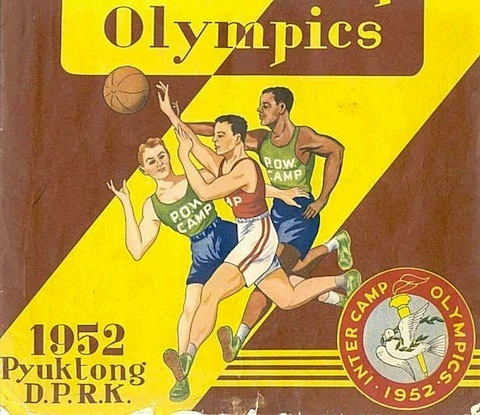
Given my attraction to tales about how folks cope with nasty twists of fate, I was bowled over to discover this rarest of Korean War artifacts: a program from the 1952 prisoner-of-war Olympics held at Pyoktong, North Korea. In addition to containing numerous photos of the sports contested—such as tug of war, football, and bizarre gymnastics, the booklet offers the thoughts of various participants. Their enthusiasm for the whole endeavor can either be construed as touching or deeply ominous:
It is a great honer for me to introduce you to this splendid book. Here, told in pictures, is the story of the greatest spectacle of our stay here in North Korea,the Inter- Camp Olympics of 1952. Each page servers as a guide that shall enable you to relive all the spine-tilling excitement of that truly marvelous athletic meet.
From the very moment the opening cerimonies began on November 15 until the closing of the meet on November 26 we witnessed splendid performances, thrills galore, great enthusiasm, sincere and wholehearted sportsmanship, and perfect goodwill among the many nationalities represented there….
Another very important factor in making this an unforgettable occasion was the attitude of the Korean People's Army and the Chinese People's Volunteers. Without their efforts such a tremendous undertaking could not have been possible, At all times the cooperation, generosity, enthusiasm, and selfless energy displayed by our captors was perfect and left absolutely nothing to be desired. The lenient treatment policy has long ago passes its title of lenient, it has instead become a brotherly love treatment for every one of us. The materials provided for the athletic meet, plus the grand array of expensive prizes and awards,were more than sufficent to prove the cincerity of the camp authorities of the Korean Peoples Army and the Chinese Peoples Volunteers in ensuring success of our first Inter-Camp Olympics
This book symbolizes the real will of all humanity to live in a spirt of brotherhood, in a world peace, free from fear, hatred, malace or antagonism. Here you can see vividly the harmonious atmosphere that pronailed at all times among men of various nationalities, races, creeds and colours.
So the question is, Should those who participated in these Olympics be condemned as collaborators, or hailed for keeping spirits aloft in the most trying of circumstances. A surprisingly even-handed discussion of that question can be found .
And more photos of daily life in a Korean War POW camp here—with the caveat that the collection's bounty of smiling faces tells only a stage-managed version of the truth.
January 20, 2012
The Purple Tin
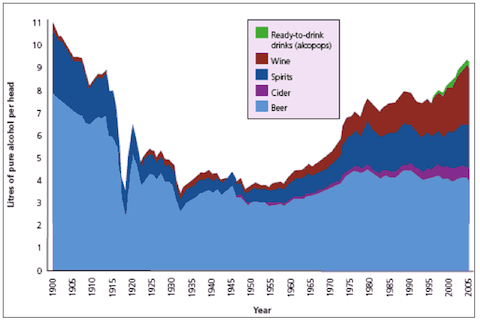
Though Europeans are generally drinking a great deal less these days, the Scottish are bucking the trend. Per the chart above, alcohol consumption has been steadily rising in the land north of the border established by the Treaty of York. The question that no one seems able to answer with any degree of certainty is why Scotland's thirst for hooch cannot be quenched. The Scottish government evidently believes the conclusions made in this 2008 study, which lays a lot of the blame on the declining prices:
here is strong evidence from over 50 studies conducted in 15 European countries, America, Canada, New Zealand and elsewhere, that levels of alcohol consumption are closely linked to the retail price of alcoholic beverages. As alcohol becomes more affordable, consumption increases. As the relative price increases, consumption goes down. In Switzerland in 1999, a 30 to 50% reduction in taxation on foreign spirits, led to a 28.6% increase in consumption of spirits. There was no significant change in the consumption of wine or beer. In March 2004, Finland cut tax on alcohol (by one third) in an effort to reduce the level of cross-border shopping undertaken by Finns in other EU countries, particularly neighbouring Estonia, where the price of alcohol was much cheaper. Following the change, liver cirrhosis deaths were found to have risen by 30 per cent in just one year, as alcohol consumption increased by 10 per cent.
In Scotland, in real terms (taking into account disposable income), alcohol is 62% more affordable today than it was in 1980.
Scotland is trying to correct that problem with a new pricing law, which seeks to forbid discounts for buying alcohol in volume. But my hunch is that the only economic tactic that will truly work is the imposition of a minimum price per unit of alcohol. That would means the end of cheap fixes like The Purple Tin, which is basically the King Cobra of Scotland. If a unit of alcohol cannot be sold for any less than forty-five pence, many fewer will have the means to splurge on ten cans of high-alcohol lager. Which will hopefully mean a lot less of this.
A question, though: Has anyone studied what led to the decrease in Scottish alcohol consumption prior to the sharp WWI-related drop-off?
January 19, 2012
The Mad Dash
Taking a day to plow through edits on Chapters Three and Four of the forthcoming book. Need to have the first 50,000 or so words to my editor by February 27th, so I'll be ducking out on occasion to enter the hardcore writing bubble. Back tomorrow with a post about the dispiriting trend in Scottish alcohol consumption.
January 18, 2012
The Specialist
By now you may have heard of the landmark federal conviction of Alfred Anaya, who played a key role in a drug trafficking ring that moved product from Mexico to the Midwest. What makes Anaya's downfall so interesting is that fact that, by the government's own admission, he never touched any drugs himself; his role was that of a master engineer, in charge of building secret compartments in the vehicles the operation used to transport its contraband.
The Feds have long been keen to bust men like Anaya, an effort complicated by the fact that there is no specific statute that bans the building of secret compartments. Anaya was tripped up by a series of wiretaps which revealed his knowledge of how the compartments would be used. Those wiretaps also hint at just how valuable Anaya's services were to the organization:
Using wiretaps issued in another investigation, authorities intercepted calls involving known drug traffickers in which they discussed having hidden automobile compartments or "traps" built for them by defendant. References to detection by customs officials and the use of x-ray-interfering carbon paper and mirror-like surfaces provide evidence that the traps were intended for illegal drug-trafficking purposes. Other intercepted calls related to the possibility of defendant's traveling to Mexico to fix a compartment that would not open.
In other words, Anaya's skillset was so respected by his paymasters that they were willing to get him down to Mexico to open a single compartment, rather than hiring local talent to solve the problem. That's a testament to the sophistication of Anaya's work, and a clue as to why federal prosecutors considered him such a grand prize.
I plan on drilling deeper into the court documents to get a better sense of Anaya's precise methods for creating world-beating traps. Amazing to me that something as simple as carbon paper could be so essential to foiling the zillion-dollar detection systems employed by Border Patrol agents.
January 17, 2012
The Worst Good Time
I'm a few pages from the end of Bill Buford's Among the Thugs, a study of Thatcher-era football hooliganism that doubles as a meditation on crowd dynamics. It's perhaps best known for its opening set-piece, in which the author tags along with a bunch of Manchester United supporters on a depraved trip to Turin. But for me, the heart-and-soul of the book is the chapter set in Bury St. Edmunds, where Buford attends a disco sponsored by the racist National Front. In describing the terrifying late-night scene at a pub filled with skinheads, Buford does a masterful job of illustrating how one man's idea of a crackling good time can be another man's idea of absolute Hell:
Nick Griffin indicated that the volume should be turned up further, ad the music was now brutally loud. The room was hot and filled with smoke and smelled of dope. The air had grown heavy and damp. Sixty or seventy lads were in the middle of the room, clasped together, bouncing up and down, rubbing thir hands over each other's heads and chanting in unison:
Two pints of lager and a packet of crisps.
Wogs out! White power!
Wogs out! White power!
Wogs out! White power!
They had taken off their shirt and were stripped to the waist, their suspenders dangling by their sides, knocking against their legs; sixty or seventy pale, narrow chests, covered in perspiration, pressed tightly together. They were bouncing so vigorously that they all fell over, tumbling on top of each other. I thought someone was hurt—a table had been knocked over—but they all clambered up over each other and, with difficulty, resumed their dancing. They fell over again, wet and hot. I don't know if it was the drink or the drugs or the delirium of the dancing or that chorus, over and over again, but there was a menacing feeling in the air—sexual and dangerous. The people in the crush were not in control—the business of falling over was not intended and not one was finding it funny, as people might in the spirit of drunken merriment. Some of the lads appeared to be in a trance.
I can honestly think of no party that I'd like to attend less than this National Front disco. And given how the night ends, with his skull being bashed against a lampost by one of the intoxicated lads, I'm sure Buford is in no hurry to repeat the experience. Yet massive kudos to him not only for gaining access to this secretive world, but also for approaching it not with a sneer, but with an honest desire to understand how young men might be attracted to—or perhaps cajoled into liking—this belligerent form of fun. What he ends up reporting seems absolutely genuine, untinged by his personal abhorrence for the National Front's odious politics. And yet that level-headed approach to the endeavor is what ultimately makes Buford's account all the more affecting, and all the more damning.
Next up on the reading list, now that I've had my fill of horrific anecdotes from 1980s' English soccer: The End of the Terraces.
January 13, 2012
The Pouring Forth of Words
A moved-up book deadline has me scrambling over these next few days, so I'm just gonna ease you into the holiday weekend with some Uzbek pop. I don't understand a word, of course, but my hunch is the ladies of Shahrizoda are preaching against the evils of materialism. The highlight is around the 1:08 mark, when the group briefly operates a kebab grill at what I take to be an Ürümqi bazaar. As an old girlfriend of mine once said, there is nothing sexier than a woman toiling over a steaming-hot griddle full of meat. (She had a summer job at Carney's at the time, so her axiom was somewhat self-serving.)
January 11, 2012
The Teetotaler of Ulaanbaatar
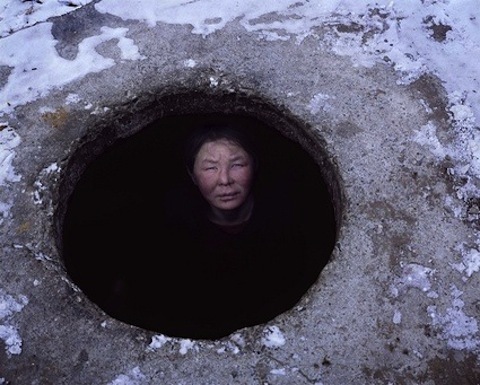
It's a little hard for Americans to wrap their heads around alcoholism's social toll in places like Mongolia, where the perpetually inebriated constitute a significant percentage of the potential workforce (and also commit the majority of crimes). So it will be interesting to see whether the government's lead-by-example campaign makes any sort of impact on the problem:
It's been a year since President Ts. Elbegdorj initiated the "Forward, to an Alcohol-Free Mongolia" campaign. On December 14, the Head of the Office of the President D. Battulga made a statement regarding the campaign's accomplishments and effects during this period of time. Since the implementation of this alcohol-free idea, every event or ceremony involving the President should happen with no alcohol. The Alcohol Free Mongolia Association was formed, and so far the President has visited 10 provinces and made speeches concerning alcoholism and its negative impacts…
We clearly remember how the President welcomed the New Year with milk instead of champagne, and many people applauded and praised his action…Since April, every ceremony in the Wedding Palace has required the use of milk as the ceremonies are alcohol-free.
I have my doubts as to whether the average citizen will be inspired to give up drinking because their president abstains. The argument in favor of the program relies on evidence from a mid-1980s Soviet experiment, when Mikhail Gorbachev switched from vodka to orange juice at state functions. But the subsequent decline in alcohol consumption (since entirely reversed) probably had more to do with accompanying restrictions on access to drink than anything else. That sort of control was easy to accomplish in a nation with a state-run economy; in modern-day Mongolia, with its 91 distilleries, the road to relative sobriety will be much bumpier.
(Image via Mikel Aristregi)
January 10, 2012
Hazardous Duty in Thule
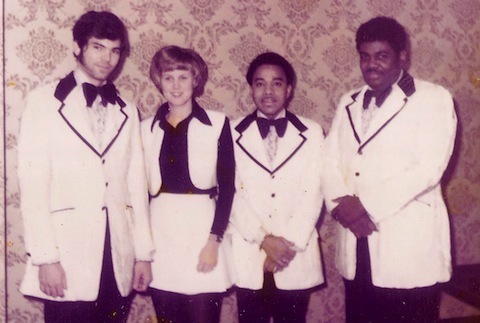
This memoir by the former bassist for Barbara Allen and the Tennessee Hot Pants includes a great vignette about playing Greenland's Thule Air Force Base, where young men once scanned the skies for incoming Soviet ICBMs. Deprived of female companionship for months at a time, and surrounded by little but shiny white nothingness for most of the year, the base's inhabitants made for less-than-inviting hosts when the Hot Pants showed up:
We were told that some of the service men there hadn't seen a woman in over a year except for some of the entertainers who came and went. Therefore, each of us had to be assigned a body guard. The body guards were Danish civilians and traveled with us every place we went on the base. Trouble was, we needed more body guards to protect us from the body guards we already had. Those guys had, as the old saying goes, "Roman hands and Russian fingers". My protector kept trying to get me to go off somewhere and have sex with him and I just laughed it off brushing away his hands at the same time.
Being in an all girl band was definitely a novelty. Each place we showed up the crowds were a bit rowdy and loud. However, that was nothing next to the reception we received when we opened our show in Thule Greenland. There were whistles, cat calls, applause, stomping, whooping and hollering. The stage was a large auditorium size and there was a space backstage for us to stay during our breaks. After our first set, I knew what that backstage area was for. What happened next came as a surprise. As soon as we stepped off that stage, hands came from all directions and my butt felt like I'd landed into a bed of lobsters. After escaping all the pinchers, I hurried back to the stage, body guard in tow, and ran behind the curtain. It wasn't long before Barbara and the rest followed.
"What was that, a feeding frenzy?" I asked.
"Oh that happens to all women who come here." the body guard answered in broken English.
Tales like these actually make me fear for our gender-imbalanced future.
January 9, 2012
At Least He's Not Pandering
One should perhaps never be surprised by the nature of political discourse in a country where the Simon and Garfunkel song "Cecilia" was once banned. Yet there is still something rather jarring about a leader who willfully disparages his own populace, as Malawian President Bingu wa Mutharika did last week:
Mutharika challenged Malawians to appreciate that at [a] certain point a person's life goes through hard times and currently several countries in the world were going through economic difficulties and Malawi was not exceptional.
"Problems are all over. Several countries are currently going through economic crisis even if you go to United Kingdom in Europe you will find problems.
"Why do you behave like chickens, it is a chicken that just cries kwe kwe kwe (mimicking chicken cry) whenever it hears something…We are not a nation of chicken[s]," said Mutharika in his usual defiant mood.
Perhaps the core spirit of Mutharika's message isn't too different from that of American presidents who've occasionally urged us to make sacrifices when times are tough. But his motivational technique is bizarre by our standards. Perhaps someone should hand him a fortune cookie that contains the axiom, "You'll catch more flies with honey than with vinegar."
January 6, 2012
A Name Lost to History
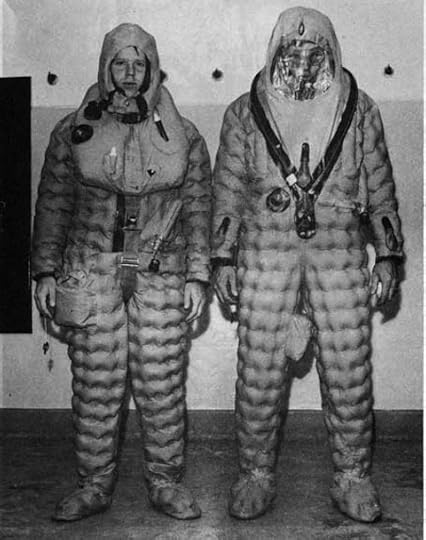
Taking advantage of a brief lull in the Wired action to steal a day for the book. Back on Monday with a post about the history of submarine rescue, a teaser of which is posted above.
One more thing: If anyone can shed light on the real name of an Algerian secret policeman who went by the handle "No Nuts" in the early 1970s, I'd be much obliged if you could share your intel. He makes some cameos in my book, and I'd like to know more about him. At this point, all I have are vague suggestions that he may have had an unpleasant run-in with a mis-wired bomb during Algeria's war of independence.




